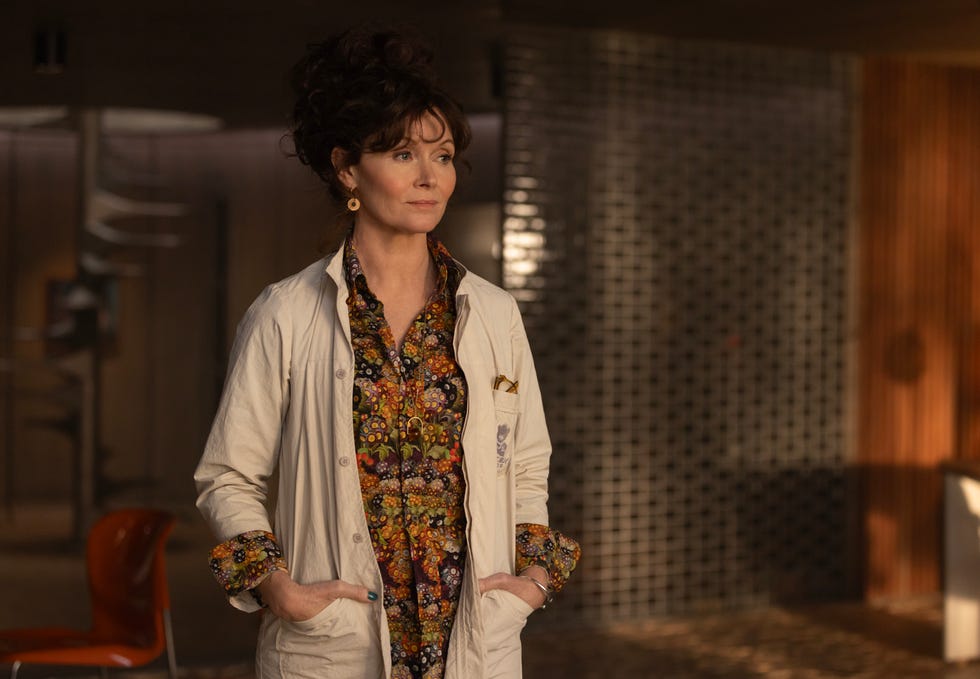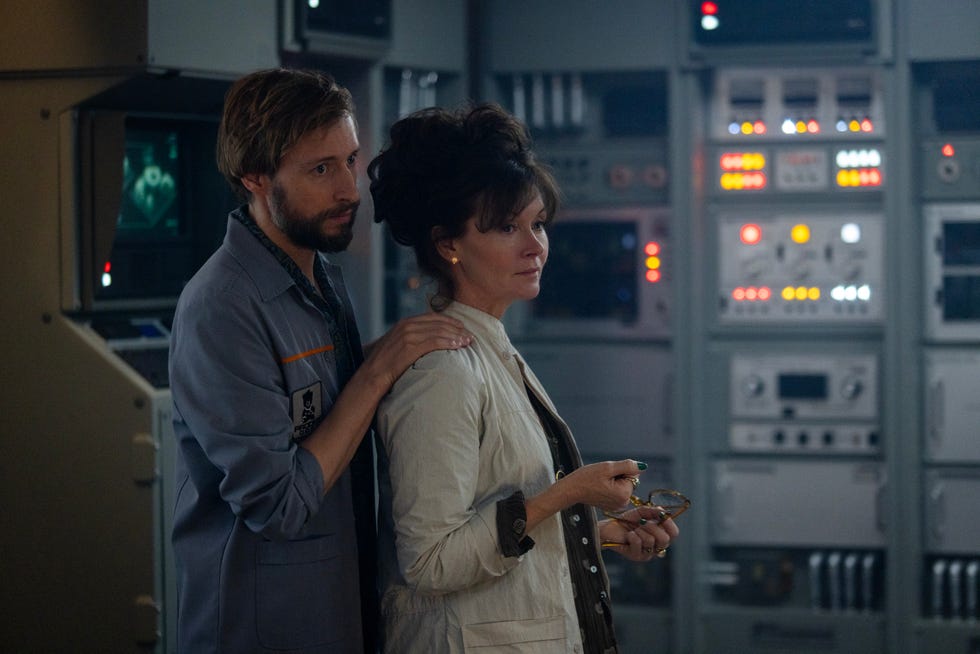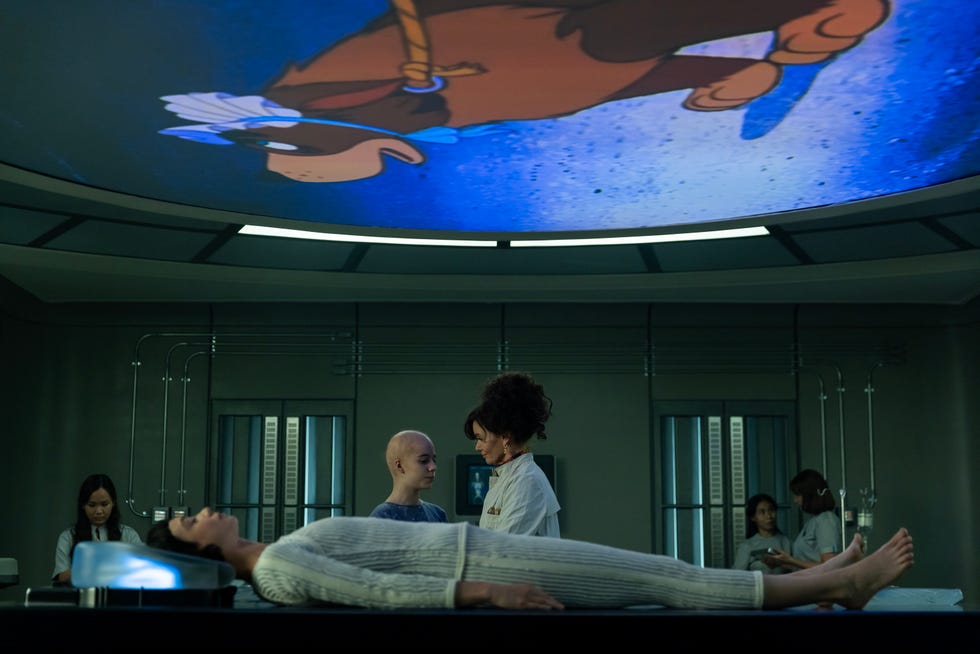Essie Davis Sounds Off on Dame Sylvia’s Big <em>Alien: Earth</em> Decision

This interview contains spoilers for Alien: Earth episode 6.
If you want to better understand the characters of Alien: Earth, study their body language. Watch how they move. In a show in which androids belly-laugh and slouch their shoulders like children (because they are), and acid-spewing Xenomorphs creep like killers in a dark alley, the physicality of characters tells their story. This even includes Prodigy scientist Dame Sylvia, played by Australian actress Essie Davis.
Zooming from her home in Tasmania, Davis tells me that Dame Sylvia is the most "normal" character in all of Alien: Earth. Surrounded by hybrids and cyborgs and eerie entities, a scientist with her hands tucked in her lab coat's pockets feels oddly unique. "That's why she's one of my favorite characters," Davis says. "She brings a real groundedness. Talking about child robots and trillionaire weirdos, you've got Dame Sylvia, who feels like the most normal person in the room. [She has] an openness and a guardedness, a neutrality that is warm and open."
In Alien: Earth, now airing on FX and streaming on Hulu, the spin-off of the Alien film series follows mankind's true first contact with creatures from deep space. On the front lines is the super corporation Prodigy, a rival to Weyland-Yutani run by eccentric trillionaire Boy Kavalier (Samuel Blenkin). Prodigy's breakthrough line of "hybrids"—artificial androids with human consciousness—are the perfect specimens to put in front of these creatures. But these hybrids don't exist at all without Prodigy scientists like Dame Sylvia and her husband, Arthur (David Rysdahl), who strive to do good and ethical work despite Prodigy's shortsighted vision and profit-seeking motives.

Essie Davis stars in Alien: Earth as Dame Sylvia, a scientist and psychologist for Prodigy who oversees the making of cutting-edge "hybrids" in this near-future dystopia.
"She is essentially one of the masterminds of creating the hybrids," says Davis of her character. "She's on the forefront of trying to create [immortality]. She's extremely ambitious, but she's still a woman in a man's world. She's at the mercy of the super wealthy financing her research."
A star in her native Australia from the detective series Miss Fisher's Murder Mysteries, Davis found international fame with the 2014 horror hit The Babadook, in which she played a stressed-out single mother haunted by a storybook phantom. In 2016, she had a memorable supporting role as Lady Crane in HBO's Game of Thrones. More recently, she starred in the acclaimed drama Nitram, directed by her husband, Justin Kurzel, which detailed the events leading up to the 1996 Port Arthur massacre.
Fittingly, there's a guardedness to Davis akin to Dame Sylvia during our interview. There were stretches of silence between us, due to not awkwardness or tension but rather Davis's careful consideration of her words. There is more to Dame Sylvia that Davis is privy to—and Alien: Earth fans will have to discover exactly what that is for themselves. (Hopefully not before long.)
"There are a lot of details, and I don't think I can tell them to you," she says with a bit of a laugh. All she can really say is that Dame Sylvia genuinely cares for the hybrids, given they are her creation. "Their humanity is extremely important to her. She wants it to be about human evolution, not artificial-intelligence evolution."
Below, Davis unpacks some of the most critical moments for Dame Sylvia in Alien: Earth thus far, including her jaw-dropping betrayal in episode 6.

Davis co-stars in Alien: Earth with David Rysdahl, who plays her husband Arthur, a fellow Prodigy scientist.
ESQUIRE: What is Dame Sylvia's relationship to her work in Alien: Earth?
ESSIE DAVIS: She's highly ambitious. She's prepared to sacrifice herself for her work. She's been working with Boy Kavalier since he was 10 years old. She's kind of a mother figure to him. She's working with an extremely smart but badly-behaved trillionaire child genius, who strangely hasn't had a childhood. She values childhood and the growth through childhood. [Boy] has no concept of that. He's never had an adolescence. So she's working with a smart, powerful, very dangerous person, and as a psychologist, working out what path to take and how to tread it carefully–she's a woman at the head of this world. She's had to make lots of compromises to keep that position and not tread on landmines as she's climbed up the ladder.
What backstory did you or [series creator] Noah Hawley sketch out for Dame? What details about her life do you know about that inform your performance?
There's a lot of details, and I don't think I can tell them to you because they may be revealed in future episodes. There's a lot more to Dame Sylvia than you've yet to meet.
Tell me about the love story between Dame and Arthur. Can you tell me how they might have met?
The gloriously gorgeous David Rysdahl and I spent a lot of time working out our "past" together. He [Arthur] would have attended one of her many lectures about psychology and genetics, and the human mind's power to operate artificial limbs using artificial body parts. They worked together in many fields across their many degrees. They fell in love, and then she got him a job at Prodigy. There's a huge mutual admiration of their minds and their ethics. She's kind of further up the food chain than he is. She's more capable than most of the other scientists she works with realize.
In episode 3, we see maternal behavior from Dame Sylvia toward Wendy. When Wendy is in recovery, Dame sleeps at her bedside, like a mother would when her child is sick. What is Dame's relationship to Wendy?
I don't want to give anything away, but Wendy is her first great achievement, her first "child." She is everything [to her]. And because Wendy is so intent on being the good big sister, she's kind of elbowed Dame out of the way of that relationship with the other children. Wendy shoved everyone out of the way to hold their hands. Dame loves her, and she feels she has to guide Wendy to guide the other children, to understand their potential and how they use that potential.
In episode 6, after Dame erases Nibs' memory, Wendy and Dame get into a fight in a way that also feels like a mother arguing with her daughter. There's a moment when Wendy tells her, "What if you're what's wrong?" Dame is left silent, but her expression says it all. What were you feeling in that exact moment?
It's a horrible thing to be told by your daughter that you are the problem. "Well, what if you are the problem?" To have that slap back when you've been instrumental in creating their life and keeping them alive–Dame is quite adept at walking the tightrope of keeping people from having crisis moments or handling tantrums, particularly from trillionaire have-it-alls. She recognizes times she has to lie to keep the peace. It's awful to know she knows what she's done, and whether or not she believes in it, she's gotta make sure that Wendy knows Dame believes in it.

Although Essie Davis is hesitant to say too much about Dame Sylvia’s origins, she says there’s far more to her character than audiences can currently see in Alien: Earth.
To your point, Wendy says "Nibs got lost," and Dame responds, "No, we helped her." Does Dame actually believe what she's saying here?
I don't know. It is almost like this is an experiment. There's a lot yet to find out [about] Dame. Dame's made lots of mistakes that she hasn't told all the other children. The fact that as soon as Nibs wakes up and Wendy's there talking, it makes Nibs doubt herself on what is going on with her. That's an extremely fatal mistake in this experiment. That is what rushing research [does], trying to get things done to reach deadlines, because apparently, that's what's most valuable in the world. That is not the aim for Dame Sylvia, but it is the aim for Prodigy. There's this point where Dame is not expecting Arthur to get fired, but she is quite aware they are expendable. They are employees. I think she's trying to make sure she gets to stay in control of this experiment.
In episode 4, we see Dame alarmed by Nibs during their session. At the end of it, Dame declares Nibs a "level three event." What is that scene all about for Dame?
She is, in a way, Dr. Frankenstein. She has created, potentially, a monster. This is an incredibly powerful body that could snap her, completely annihilate her in a second, and it's a child. A child rebelling against the mother figure. Dame hasn't been a parent. She knows from the outside that the first person a child is going to push away is their mother. But this is her first experience of being pushed hard, and by someone who could actually snap her neck.
Nibs has clearly been a vulnerable candidate, but she's much more dangerous [than she knew]. Dame hasn't really considered the fact that there wouldn't be gratitude, there wouldn't be time for moral guidance where these children-into-adults can be guided and nurtured to amazing, immortal humans. Dame has always known that it's going to be a struggle to teach them how to be a good person. Their "dad," Kirsch, doesn't really care about the humanity factor. And role models like Boy Kavalier, his ethics are very questionable anyway. So she's aware her and Arthur are going to guide these children, and that's gonna be a fight, but she doesn't expect the fight to come from the children themselves.
Why does Dame comply with Prodigy and erase Nibs's memories? She initially sides with her husband and warns that therapy is the best route for Nibs, but she agrees to the procedure anyway.
If he doesn't, she might have her own power taken away. She might lose contact with these children, and they might dispose of Nibs. They might just freeze her or destroy her or shut down that one particular unit. She might be taken off contact with the other children. She can do a lot of the stuff that Arthur does. She can do the data side of things. She's just at that point where there's a lot of questions going on. Maybe this is a potentially useful ability to, data-wise, remove trauma. Could that be useful to humankind?
It is incredibly prescient that this show is dealing with AI ethics and corporations running the world. It is a particularly gripping and terrifying journey to realize ethically. Where do we stand on AI? What I love about this show is that everybody's point of view is wonderful, even if you disagree with them or disgusted by them. It really does put you in the shoes of so many. It's scary. What are we creating? Who do we trust? How are we going to actually safely, and kindly, go forward as a species?
It's so interesting you play a maternal figure in Alien: Earth, because a movie that people still remember today is The Babadook. The tenth anniversary for that movie was last year. Why do you think that movie resonated with so many people everywhere?
It's a well-deserved success story. It's a really good story and an exceptionally-made movie. I'm really proud of it. The thing that resonates so much with people is [the question]: Who are the monsters? The danger of not caring about your mental health, the terror of losing control, it's wild and wonderful. It's a psychological study of grief and parenting. Little Noah [Wiseman, my then-child co-star] is a divine creature. I find it very strange that people go, "This horrible child." I go, "He's a little boy!" I love that it became this sleeper hit. I love that it keeps coming back year after year.
It meant something different for everyone. One of my great surprises when we came to Sundance was that our audiences were 13-year-old kids going, "That's so scary!" And 65-year-old biker gang guys going, "That's the story of me and my mom."
esquire





